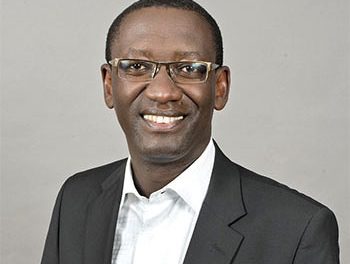
Former NSX CEO proud of his time at the bourse
John Mandy, a chartered accountant by profession, has steered the Namibian Stock Exchange for ten years.In a wide ranging interview with the Economist, Mandy said his ten-year tenure at the helm of the NSX was productive as measured by the improved financial fortunes of the stock exchange and its capitalisation, among other achievements.
The recently retired CEO of the Namibian Stock Exchange (NSX) John Mandy says he is satisfied with the growth of the capital market in the country that has seen the local bourse grow to become Africa’s second largest stock market in terms of capitalisation.
Mandy said: “Being an accountant one gets measured on financial results. When you look at the NSX at the end of February 2003 [a month before he become CEO], the NSX had reserves of N$5.7 million and by the end of December of 2012 [five months before his contract expired], reserves were over N$35 million.”
He said one of the highlights during his time at the NSX was being able to keep pace with best practices and systems in capital markets despite legislative challenges hampering the growth of the local capital markets, and having a lean staff complement.
“We kept pace with the best practices and systems. We outsourced our trading system to the JSE, and so we haven’t spend a lot of effort and cash on having one of the best trading systems, and staff wise we have been a lean organisation. Last year we moved on to the Millenium IT trading system which the JSE now hosts rather than outsource from the London Stock Exchange,” Mandy said.
During his time at the NSX, a number of local and international companies successfully listed on the stock exchange. Trustco, BidVest and recently Bank Windhoek are some of the notable companies that had a successful listing.
The stock exchange also had a private equity listing while a number of state-owned enterprises, and the majority of the local commercial banks prepared medium term note programmes and issued bonds.
Last year, B2Gold, a Vancouver based mid-tier gold producer and developer of the Otjikoto gold mine, in conjunction with Bank New York Mellon, scored a first for the country’s financial market by issuing a Namibian Depositary Receipt on the Namibian Stock Exchange.
In addition, Agra opened the local Over the Counter Market (OTC) early this year after converting from a co-operative to a limited company. And so far the company has managed to trade over six million shares on the OTC platform provided by the NSX.
During that period the NSX also disbursed N$1 million to the Graduate School of Accounting in an effort to get more Chartered Accountants in Namibia. The NSX also recently started assisting local Chartered Financial Analysts (CFA) with their school fees for an internationally recognised qualification.
But despite this progress, the former NSX CEO bemoaned the fact that the local financial legislative environment has not kept pace with that of its peers. For instance, Mandy said the JSE’s Security Services Act, a replacement of the 1985 Stock Exchanges Control Act, is being updated again while Namibia does not have an SSA equivalent.
“The NSX would like to bring new instruments to the market but this is hampered by the delays in finalising the omnibus Financial Institutions and Markets Bill as there is no certainty what will be included in the final draft.
“So generally our legislative environment has been lacking,” he said.
To compensate for the lack of an enabling legislative environment, Mandy said the NSX has drafted, with the help of the Institute of Directors of Southern Africa, a NamCode – a Namibian corporate governance code. The code was recently distributed to various reviewers in an effort to get the best corporate governance practices, including King III principles, adopted in Namibia for all entities in Namibia not only on listing.
Although the market capitalisation of local stocks have now gone over N$17 billion, Mandy said there was still a long way to go to meet the 75% of GDP objectives set in the financial sector strategy.
“We are a long way from that, but we have taken the first steps towards this, and we think the way to do it is for government and the regulators to say, if you want a licence from us, if you want an EPL or one of the hydrocarbon licences or if you want authority to do something, you have got to list.”
Mandy said he sees no reason why Namibian companies should use foreign consultants since the country has sufficient local expertise. He said: “It appears that in Namibia we still rely on outside/foreign consultants to give advice. A Namibian who has the skills is not accepted as an expert, but if you have a briefcase and you come from Johannesburg or from elsewhere in Africa, then you are the preferred expert.
“So we are not using the skills that we have nurtured and created. Having just left permanent employment, the worst thing now is this age limit. After gathering all this experience over 40 years or more and you reach a magical age of 65 or more, all of a sudden you are no longer needed.
“Surely the skills could be used in a mentoring or nurturing process, and we have shown it here at the NSX. We recruited a company secretary, and as we said at the time, with guidance you could, within a period of two years lead the organisation.”
Mandy was born on 02 May 1946 in Johannesburg and matriculated at Pretoria Boys High School in 1963. He studied part-time at the University of Pretoria graduating with a B Com Accounting Degree; he completed his CTA at Unisa and qualified as a Chartered Accountant in 1972.
After articles he worked at Chrysler SA and then returned to the accounting profession where he worked for Arthur Andersen & Co in Johannesburg and Pretoria for nearly 10 years and then spent the major part of the 1980s as Managing Director of Stocks & Stocks Properties.
In July 1989 he joined Harold Pupkewitz as Financial Director designate and became a Namibian citizen in 1997 while employed at Stocks & Stocks Namibia, after a brief career at Metje & Ziegler. In 1999 he was appointed CEO of Namibian Harvest Investments and in March 2003 joined the NSX as General Manager and later as CEO.
During this period he became a Fellow of the Institute of Chartered Secretaries and presented CPD training on the 2004 Namibian Companies Act.
He relinquished the position of CEO at the end of 2012 and retired from the NSX at the end of his contract on 31 May 2013. He was recently appointed the Chairman of the Audit Committee of a JSE-listed company.
Mandy also managed the local chapter of the Miss Universe pageant when Namibia hosted it in 1995, and also helped the Swakopmund Hotel and the Windhoek Country Club to acquire their Casino licences.
Mandy, who is now 67 years old said he would like to remain economically active for the foreseeable future. “I don’t think that when you reach a magical number that you should stop; you can do that if your dad was an Oppenheimer, but my dad was a postal worker.”










































